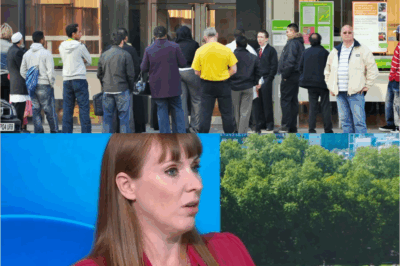America Bet Its Future on a Plan Dave Chappelle Tore Apart Years Ago

In the evolving landscape of American economics and trade, comedian Dave Chappelle’s insightful critique of trade tariffs and manufacturing jobs has resurfaced—bringing to light the comedic but stark warnings he laid out years ago. With the backdrop of ongoing trade tensions between the United States and China, Chappelle’s observations during his 2017 Netflix special have taken on a new layer of significance. The excerpt from his stand-up highlighted the absurdity of President Trump’s bold plan to bring back manufacturing jobs to America, foreseeing the potential chaos this policy would create.

At that time, Chappelle humorously predicted that American consumers would bear the brunt of these tariffs with astronomical price hikes on everyday items, suggesting that items like iPhones could eventually reach a staggering price of $9,000. Fast-forward to today, and it’s clear that many of those predictions are now manifesting. As tariffs on imported goods rise, consumers are seeing the increasing costs on a variety of products, from electronics to clothing.
The Escalating Tariff Crisis
Recently, former President Trump implemented significant increases in tariffs against China, initially introducing a 34% hike, which was followed by an additional 50%. This series of tariffs came as a response to China’s own retaliatory measures against U.S. products. The sheer scale of these tariffs is set to escalate the price of basic consumer goods, creating a ripple effect in an already fragile economy.

The ramifications of these policies are prompting economists and everyday consumers alike to reevaluate the effects of such drastic measures. As the trade war continues to evolve, Chappelle’s prophetic insights take a comedic turn that many are now interpreting as eerily accurate forecasts of economic troubles. With household budgets tightening, many find themselves grappling with the reality that the manufacturing jobs Trump promised to revive seem unlikely to return in significant numbers, a prospect that has left citizens scratching their heads.
Criticism from Industry Experts
Supporting Chappelle’s concern are voices from within the political arena, such as Vice President JD Vance. Vance has reiterated the importance of revitalizing America’s manufacturing base and emphasized the need to reduce dependency on foreign production. His critique of current policies coincides with Chappelle’s earlier warnings, highlighting that the promise of job creation in the U.S. may not be as attainable as touted by the former President.

Meanwhile, Chinese officials have taken a rather mocking stance towards the idea of American workers reclaiming manufacturing jobs. They argue that reestablishing labor-intensive manufacturing positions in the U.S. is not only impractical but also processes that no longer align with the current state of the American workforce. The discussion surrounding this topic raises critical questions about the future of trade, jobs, and economic policy in the United States.
The Broader Implications for the American Economy
The debate surrounding tariffs and manufacturing jobs has become a keystone topic in American politics. Chappelle’s comedic critique serves as a reminder that economic policies and their impacts are not just fodder for politicians but deeply affect the lives of everyday citizens. As the price of goods continues to rise due to increasing tariffs, many Americans are left to wonder if the gamble that America has taken on these trade policies will pay off in the long run.

This ongoing saga of trade policies highlights the precarious balance between national economic strategy and the reality faced by consumers. The consequences of these decisions ripple through the economy, often impacting low and middle-income families the hardest. For individuals that once envisioned a return to a manufacturing-heavy economy, the realization that these promised jobs may not materialize raises significant concerns about the future.

As America negotiates its economic future, the comparisons to Chappelle’s past critiques raise essential questions about the direction of trade policy and its effects on the average American. The intersection of humor and serious economic commentary serves to reinforce the importance of scrutinizing the policies that affect our daily lives.
News
“BANKRUPT BRITAIN?!” – Labour’s Plan to WATER DOWN Its Already Flimsy Welfare Reforms Could HURL the UK Into TOTAL FINANCIAL MELTDOWN
LABOUR is making a complete mess of welfare. Panicked and driven Left-wards by Reform’s surge, the Government is wobbling on the…
“TURKISH HOTEL TERROR!” – Brit Dad Brutally BEATEN TWICE in Front of His Kids… Family Holiday Spirals into a Living Nightmare
The alleged attackers reportedly had a feared reputation A DAD-OF-TWO said he was attacked twice in front of his kids…
“FED to PIRANHAS!” – 31-Year-Old Mum of 3 Vanishes After Ex’s Savage Revenge… Body Still Missing in Brazil
A MAN was caught on CCTV putting his former wife’s body in the boot of a car before coldly dumping…
“Dinner Party of DEATH!” – You Won’t Believe Erin Patterson’s Gross Confession After Her ‘Killer’ Mushroom Meal Claimed 3 Lives
MUSHROOM cook Erin Patterson who is accused of killing three people with a poisoned beef wellington graphically described how she…
HOLIDAY BLOODBATH! Teen SLASHED to Death with Broken Bottle in Lisbon—UK Tourist (27) DRAGGED Back to Portugal in Dramatic Midnight Extradition
Daniel was reportedly attacked while trying to defend a friend A BRITISH tourist has been arrested and extradited to Portugal…
LIVERPOOL PARADE CARNAGE! 53-Year-Old Driver PLOUGHS into Crowd—47 Injured, 4 Kids Hurt—Police Shout “NOT TERROR!” Fans in SHOCK
Emergency crews arrived to find people lying injured in the road and some trapped under the car FOUR children were…
End of content
No more pages to load












